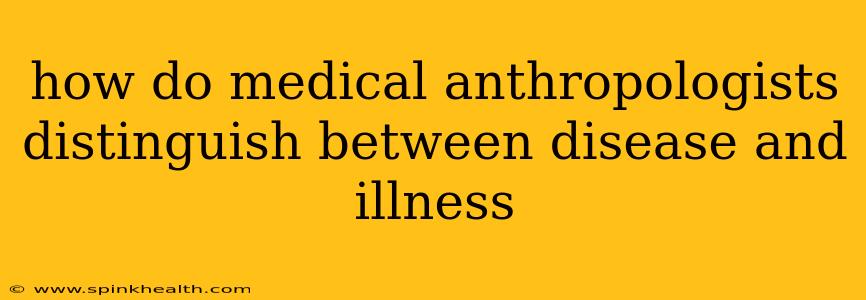How Medical Anthropologists Distinguish Between Disease and Illness: A Journey into the Body and the Mind
The world of medicine isn't simply about lab results and diagnoses; it's deeply intertwined with culture, experience, and meaning. This is where medical anthropology steps in, bridging the gap between the biological and the social. One of the core concepts medical anthropologists grapple with is the distinction between disease and illness. It's not simply a semantic exercise; understanding this difference is crucial for providing truly holistic and culturally sensitive healthcare.
Imagine this: A patient presents with a persistent cough and fever. A doctor, using medical technology and knowledge, diagnoses pneumonia – this is the disease. But that patient's experience of that pneumonia – the fear, the disruption to their daily life, the cultural beliefs they hold about illness – that's the illness. It's the lived experience of being unwell.
Let's delve deeper into what medical anthropologists consider when making this critical distinction:
What is Disease?
Disease, in the medical anthropological perspective, refers to the biological malfunctioning of the body. It's the objective, clinically identifiable condition. Think of it as the purely physiological aspect: abnormal cells, bacterial infection, organ failure. It's something that can be measured, diagnosed, and often treated with medication or surgery. It's the realm of the doctor, the lab technician, the medical imaging.
What is Illness?
Illness, on the other hand, is the subjective experience of being unwell. It's the individual's perception and understanding of their condition, deeply shaped by their cultural background, personal beliefs, and social context. It encompasses the physical symptoms, of course, but also the emotional, psychological, and social ramifications of having a disease. It's the patient's narrative – their suffering, their fear, their coping mechanisms. This understanding is pivotal for culturally sensitive treatment.
How Do These Concepts Intersect?
Disease and illness are not mutually exclusive; they are intertwined. A person can have a disease (e.g., hypertension) but not experience it as an illness (if they are asymptomatic or unaware). Conversely, someone might experience significant illness (e.g., intense anxiety) without a clinically identifiable disease. The interplay between these two concepts is what makes medical anthropology so fascinating.
What are the Implications of Understanding this Distinction?
The implications of understanding this distinction are profound for healthcare:
-
Culturally Sensitive Care: Recognizing that illness is shaped by culture means tailoring treatment plans to meet patients' individual needs and beliefs. A treatment plan that works in one culture might be completely ineffective or even offensive in another.
-
Patient-Centered Approach: By acknowledging the subjective experience of illness, healthcare providers can build stronger doctor-patient relationships based on trust and understanding. Listening to the patient's story, their concerns, and their perceptions is crucial.
-
Improved Health Outcomes: A holistic approach that considers both the disease and the illness is more likely to lead to improved health outcomes as it addresses not only the biological condition but also the social and psychological factors that influence recovery.
-
Understanding Health Disparities: This distinction sheds light on health disparities between different populations. Cultural beliefs about illness, access to healthcare, and societal factors all play a role in shaping health outcomes.
How do social factors influence the experience of illness?
Social factors heavily influence the experience of illness. For example, someone from a low-income background might delay seeking medical attention due to financial constraints, leading to a worsening of their condition and a more severe illness experience. Similarly, social stigma surrounding certain diseases (e.g., mental illness) can prevent individuals from seeking help, increasing their suffering.
Does culture influence the way people define illness?
Absolutely! Cultures vary widely in how they define and perceive illness. Some cultures attribute illness to supernatural causes, while others focus on biomedical explanations. These differing perspectives influence treatment-seeking behavior, the types of treatments accepted, and overall health outcomes. Understanding these cultural variations is critical for effective healthcare delivery.
By understanding the subtle yet significant difference between disease and illness, medical anthropologists contribute invaluable insight to the healthcare field. It's not just about treating the body; it's about understanding the person within their social and cultural context. This holistic approach ultimately leads to more effective and compassionate healthcare for all.

